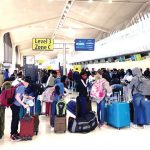The World Health Organisation (WHO) has warned of adverse consequences of the immediate suspension of funding for HIV programmes in Nigeria and other low- and middle-income countries under the United States President’s Emergency Plan for AIDS Relief (PEPFAR) – a flagship initiative of the global HIV response established over 20 years ago.
WHO says the move will upset HIV programmes and have a direct impact on millions of lives that depend on the regular supply of safe and effective antiretroviral treatment (ART), and is urging the Trump administration to create more exemptions to ensure the delivery of lifesaving HIV treatment and care in the affected countries. More than 1.9 million Nigerians are currently receiving antiretroviral treatment.
The Director General of WHO, Dr Tedros Adhanom Ghebreyesus, who expressed worry over the development, said programmes that will be affected by the funding cut, provide critical HIV therapy to over 30 million people around the world.
READ ALSO:Oyo state government warns against unregulated Valentine Day celebrations
In a statement, Tedros cautioned that a funding freeze can raise the risk of illness and death for those living with HIV and hinder efforts to prevent the spread of the virus within communities.
He said that if the situation continues, it could lead to more new infections and deaths, undoing years of progress, and could return the world back to the 1980s and 1990s, a time when millions died from HIV each year, including many in the United States.
The statement reads:
WHO expresses deep concern about the implications of the immediate funding pause for HIV programmes in low- and middle-income countries. These programmes provide access to life-saving HIV therapy to more than 30 million people worldwide.
READ ALSO:Trump stops HIV funding for Nigeria, others
“A funding halt for HIV programmes can put people living with HIV at immediate increased risk of illness and death and undermine efforts to prevent transmission in communities and countries.
“Such measures, if prolonged, could lead to rises in new infections and deaths, reversing decades of progress and potentially taking the world back to the 1980s and 1990s when millions died of HIV every year globally, including many in the United States of America.
“For the global community, this could result in significant setbacks to progress in partnerships and investments in scientific advances that have been the cornerstone of good public health programming, including innovative diagnostics, affordable medicines, and community delivery models of HIV care.
“We call on the Government of the United States of America to enable additional exemptions to ensure the delivery of lifesaving HIV treatment and care,” Tedros stated.
Established by the U.S. Leadership Against Global HIV/AIDS, Tuberculosis, and Malaria Act of 2003, PEPFAR is the largest health initiative focused on a single disease worldwide. Over the past two decades, it has funded programmes that saved more than 26 million lives.
PEPFAR has been active in Nigeria since 2003, aiming to tackle the HIV/AIDS epidemic. The programme has invested over $7.8 billion to enhance the health system and improve access to HIV treatments. It increased the number of antiretroviral treatment sites from approximately 25 in 2001 to over 1,000 at present.
The rate of HIV infection dropped from 5.1 percent at the programme’s debut to 1.4 percent in 2018. PEPFAR has also enhanced data management and strengthened Nigeria’s health systems, while helping to develop policies and boost human resources.
PEPFAR aims to eliminate HIV/AIDS as a public health issue by 2030. It also seeks to help Nigeria meet the “95-95-95” targets, which focus on diagnosing, treating, and sustaining HIV treatment.


